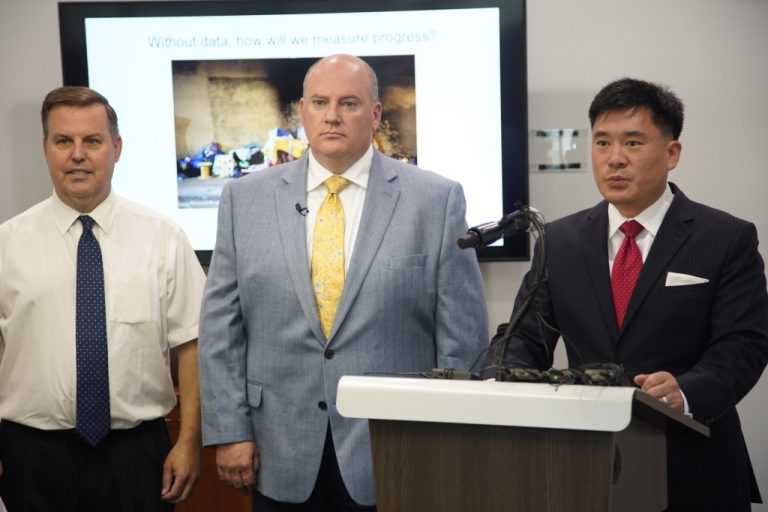

A retirement program with a controversial history at the city of San Diego now may be under consideration for the county’s deputy sheriffs.
The Deputy Sheriffs’ Association of San Diego County is urging county officials to launch a study of a deferred retirement option plan, or DROP, that along with other proposals would be aimed at addressing staffing shortages, keeping deputies from leaving the Sheriff’s Department and doing away with mandatory overtime.
The DSA has commissioned an actuarial analysis that suggests the county could create “a cost-neutral” DROP program and mentioned the idea in a Sept. 21 letter to Board of Supervisors Chair Nora Vargas.
In a draft of a letter to the full board for its Dec. 5 meeting, the association is asking that Supervisor Terra Lawson-Remer make a recommendation for county Chief Administrative Officer Helen Robbins-Meyer to work with the county’s pension system to confirm whether a deputy sheriffs’ DROP program would indeed be cost neutral.
In recent months, the deputies’ union has sought to raise public awareness of widely acknowledged staffing and overtime issues. In a Sept. 6 news release, the DSA called on the county to “investigate and implement extreme solutions” to ensure high-quality public safety services.
The DSA contends the situation has created a financial burden for the county, hurt morale within the department ranks and made it difficult for the Sheriff’s Department to retain personnel. In numerous documents, the union has presented myriad numbers and facts in an attempt to quantify the problem — along with salary adjustments to rectify it and the potential for a DROP program.
These concerns are not unique to the county. Police agencies across California, including the city’s Police Department, have been struggling with similar issues. Salaries and benefits have been increased in the city in an attempt to reverse the situation or at least stabilize it.
Various types of deferred retirement plans are common in public agencies across California.
But the DROP concept has a special history in San Diego. The city’s program — which was open to most employees, not just police officers — was largely vilified in the early 2000s as an example of what critics considered to be excesses and mismanagement in the city pension system.
The program allows an employee to officially retire but continue working for up to five years. During that period, the employee receives a salary and collects a pension. The pension goes into a separate account that can’t be touched until the worker leaves the city payroll. At that time, the retiree begins receiving their monthly pension benefit as well as a payment from the DROP account.
The idea behind the program was to entice experienced employees with institutional knowledge to stay around longer, which would benefit the city as it sought to hire and train new employees. The city adopted the program in 1997.
For some years, the program didn’t receive much public attention. Then it was revealed that the city pension system had a large unfunded liability created in part by an agreement to increase employee benefits while relieving the city of making necessary payments to the fund.
Several officials faced criminal charges, but the prosecutions largely fizzled out.
Critics maintained the DROP program, which became a lightning rod for the overall scandal, created a double-dipping pension system.
Amid the controversy, the city stopped offering the DROP benefit to new employees starting in 2005. There were disputes as to whether, or how much, the program cost the city.
While that controversy has faded, it still remains in San Diego’s civic memory and the program, on occasion, continues to surface in the news.
In 2017, The San Diego Union-Tribune reported that hundreds of retired municipal employees who took part in the DROP program were rehired by the city on a part-time basis, leading to some accusations of triple-dipping.
Many of those retirees were able to step right in and do the job without lag time for training because of previous experience.
Just last month, DROP was mentioned briefly in some news reports about San Diego Police Chief David Nisleit, Executive Assistant Chief of Police Chris McGrath, and Assistant Chief Sandra Albrektsen retiring next year. All are DROP participants.
It seems unavoidable that the context of what happened years ago at City Hall will be part of the discussion at the County Administration Center as the DROP proposal is considered.
The pension systems are different and separate. Both have multibillion-dollar unfunded liabilities, but while the county has had its disputes over the retirement fund, they have been nothing like the city debacle.
Other DSA proposals to enhance pay for certain deputies haven’t gained traction.
“These proposals were all rejected based on their cost to the department; however, the cost of these proposals is a fraction of what the department is currently spending to recruit and train new deputies and should be reconsidered,” the DSA said in the letter to Vargas.
“We are not asking for additional funds; we are asking for current funds to be reallocated to address retention initiatives.”
It appears that will be the crux of the argument over whether the county should adopt a DROP program.
The actuarial analysis commissioned by the deputies’ association stressed “(d)esigning a cost-neutral DROP program can be challenging.”
The study lays out various scenarios for a DROP program, including a complex structure “if theoretical cost neutrality is deemed the most important factor.”
Whether any of the city’s history is considered relevant as the county considers the deputy sheriffs’ proposal remains to be seen. What will matter, or should, is whether the supervisors see the program as advantageous on fiscal and public safety grounds.
What also may be determined, after all these years, is whether DROP is still a four-letter word in San Diego.
What they said
Headline on a story by George Varga, music critic for The San Diego Union-Tribune.
“Rolling Stones announce 2024 ‘Hackney Diamonds’ concert tour, sponsored by AARP…”






